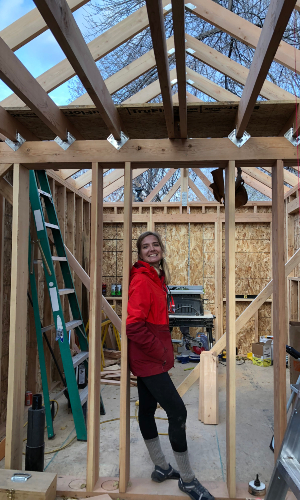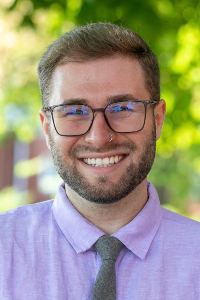
Bobette Wilhelm Civic Scholars Program

The Bobette Wilhelm Civic Scholars Program provides honors students with the tools to identify various components of service-learning to effectively make decisions about identifying and building relationships with community partners throughout their academic and professional lives. These tools will equip students with the skills to carry out observational research to personally reflect on the application of service-learning and to carry out theme-based research to address the needs of their partner organization(s) and provide well-researched solutions for further implementation. This program is geared toward students who are service-oriented, who need service hours for academic programs, and those who want to foster a connection with their community.
The namesake of this program, Bobette (Bobbi) Wilhelm, was an Idaho State University and University Honors Program alumna who believed in the transformative power of education and the importance of improving the world in which we live throughout every stage of life. Her personal experiences with housing and food insecurity taught her to see beyond stereotypes and recognize the inherent value of all people. In Bobbi’s own words, “we often make judgments about people who are in need, and most of the time those judgments are wrong. I want to challenge us all to look beyond a label and see a person.” In her passing, Bobbi left a significant donation to the UHP that will be transformational for students for years to come. In light of her commitment to civic engagement, the community, and education, the University Honors Program will honor her legacy through this academic certificate program and the Bobette Wilhelm Memorial Scholarship.
The University Honors Program (UHP) aspires to create a more enriching university experience for the members of its program. The UHP does this by engaging students academically, as well as co-curricular opportunities like undergraduate research and civic engagement. These facets of our program aim to create well-rounded, socially conscientious students who understand that being at a university is more than just what is accomplished in the classroom.
Bobette Wilhelm Civic Scholars Program
The Bobette Wilhelm Civic Scholars Program provides honors students with the tools to identify various components of service-learning to effectively make decisions about identifying and building relationships with community partners throughout their academic and professional lives. These tools will equip students with the skills to carry out observational research to personally reflect on the application of service-learning and to carry out theme-based research to address the needs of their partner organization(s) and provide well-researched solutions for further implementation. This program is geared toward students who are service-oriented, who need service hours for academic programs, and those who want to foster a connection with their community.
The namesake of this program, Bobette (Bobbi) Wilhelm, was an Idaho State University and University Honors Program alumna who believed in the transformative power of education and the importance of improving the world in which we live throughout every stage of life. Her personal experiences with housing and food insecurity taught her to see beyond stereotypes and recognize the inherent value of all people. In Bobbi’s own words, “we often make judgments about people who are in need, and most of the time those judgments are wrong. I want to challenge us all to look beyond a label and see a person.” In her passing, Bobbi left a significant donation to the UHP that will be transformational for students for years to come. In light of her commitment to civic engagement, the community, and education, the University Honors Program will honor her legacy through this academic certificate program and the Bobette Wilhelm Memorial Scholarship.
The University Honors Program (UHP) aspires to create a more enriching university experience for the members of its program. The UHP does this by engaging students academically, as well as co-curricular opportunities like undergraduate research and civic engagement. These facets of our program aim to create well-rounded, socially conscientious students who understand that being at a university is more than just what is accomplished in the classroom.
Civic Scholars Learning Outcomes
- Reflect on the application of service-learning in personal and professional settings
- Identify key factors in choosing a service partner
- Establish relationships through long-term service partnerships
- Analyze a community partner through gathering observational data
- Develop a proposal including action steps for a partner organization
- Present proposal to service partner and UHP representative(s)
Civic Scholars Program Requirements |
|
|---|---|
|
Core Course Requirements |
HONS 3301: Maximizing Community Impact (1 Credit) HONS 3302: Research Service-Learning Project (2 Credits) HONS 4494: Honors Service Capstone (1 Credit) |
|
Honors Credits Requirements |
25 Honors Credits Total, which must include:
|
|
Service Hours Requirements |
Students are required to gain a certain amount of service hours with one partner organization. The connection to one partner organization demonstrates a level of commitment and makes carrying out their capstone project easier. The organization will be vetted by the Civic Scholars Program Coordinator prior to a student completing their hours. 250 Hours (Additional opportunity to network, understand the organization, and varied experiences) |
|
Field Notes |
Students will complete a set of field notes for each time they complete hours at their service site. |
|
Honors Service Capstone Presentation |
Students will be required to write a final reflection and give a final presentation as the culminating activity of the Civic Scholars Program in order to earn the certification. The goal is for students to conduct a needs analysis, extrapolate themes from those needs, research the literature to see how other organizations have gone about addressing those needs, and then provide a proposal and plan of action for their partner organization. The slideshow and paper will also include a reflection about their experience, what they learned, and what their major takeaways were from the experience. This final presentation will be evaluated through pass/fail (with revisions as an option) by a service partner representative, the Civic Scholars Program Coordinator, and a member of the Honors Advisory Committee. |
Local Service Opportunities |
||||
|---|---|---|---|---|
|
Outdoors & Environment |
Healthcare |
Food Banks & Shelters |
Arts & Education |
Miscellaneous |
|
Heritage Healthcare of Idaho Hospice Care Alliance Healthcare of Idaho Hospice Care |
ISU Intensive English Institute Hispanic Youth Leadership Summit / High School Equivalency Program |
|||
Maximizing Community Impact (1 Credit) | Offered Every Fall
Maximizing Community Impact is an Honors course that helps students in the process of becoming a more engaged member in the community. This course examines the various foundational components of community service. During this semester, students will explore conceptual ideas of service and apply these concepts with community partners to carry out an applied service-learning opportunity. Students will also collaboratively explore an applied case study within Honors.
Research Service-Learning Project (2 Credits) | Offered Every Spring
Research Service-Learning Project is an experiential course that will expose students to the complexity of various service-focused issues in Pocatello, Idaho. Students will learn about different organizations who address these issues and have the opportunity to serve as volunteers within them. Through service-learning, students will carry out data gathering, research, and personal reflections to capture their experiences in addressing these various issues.
Civic Scholars Capstone (1 Credit) | Offered Every Fall & Spring Semester
Honors Service Capstone provides students with in-depth mentorship in carrying out their data analysis of the organization’s needs, extrapolating themes from those needs, researching the literature to see how other organizations have gone about addressing those needs, and then providing a proposal and plan of action for their partner organization. This preparation course will also provide students with guidance on their capstone presentation. This includes the development of their final slideshow and presentation skills.
Q1. If I pursue the Civic Scholars Program, am I still able to earn my Honors Distinction or Degree?
A1. Absolutely! All honors students must complete an Honors Distinction or Honors Degree. The Civic Scholars Program serves as a way to augment student’s honors curriculum through a service-focused program.
Q2. When can I complete service hours? Do hours count only during the Fall or Spring semesters?
A2. Service hours can be counted during spring, summer, fall, and winter break. Hours completed in the Fall or Spring semesters must be submitted during finals week of that semester. Hours completed during winter or summer breaks must be submitted the week before classes start of the upcoming academic semester
Q3. When can hours with a partner organization start to count?
A3. Students wanting to graduate as a Civic Scholars Program before Spring 2026 may begin to log hours after a meeting with the Civic Scholars Program Coordinator to understand policies and procedures. For students graduating as a Civic Scholar Program after Spring 2026, students are then able to begin logging their service hours when they have completed HONS 3302. Please email the Civic Scholars Program Coordinator for any questions or concerns!
Q4. I am graduating before the Spring of 2026 and I am really interested in this program! Can service hours be counted retroactively?
A4. Yes, for students graduating in Spring 2025, Fall 2025, Spring 2026, or Fall 2026, we would be able to go back and count hours that were previously completed. This is to provide the opportunity to students who have already completed much of the necessary work. Field notes will not be required for retroactive hours but a confirmation from the service representative will be required. Students must meet with the Civic Scholars Program Coordinator to add course requirements to their academic plan of study!
Q5. What happens if I am having a bad service experience and would like to switch my site? Do I need to start my hours over?
A5. If at least 100 hours of the required service are left, a student may switch to a different service partner if there is an issue with the organization. Students will be able to count the previous hours of service. Students will use the field notes and data gathered from the culminating experience for their presentation and reflection.
Q6. Can I be paid for my service?
A6. No, for this track we are specifically looking for volunteer service provided to a community partner organization.
Q7. Can service be provided to a for-profit organization?
A7. Absolutely, as long as the organization has a demonstrated need for volunteer service, a history of working with volunteers, and has been reviewed by their advising coordinator. (EXAMPLE: Volunteer service at an assisted living home where a student develops patient care skills)
Q8. What type of organizations are not permitted as a service partner?
A8. Any organization that does not 1) have a demonstrated need for volunteers, 2) a history of working with volunteers, or 3) that does not pass the review of the Civic Scholars Program Coordinator.
Q9. Does digital service count?
A9. Absolutely, as long as the Civic Scholars Program Coordinator can make contact with the organization’s representative for onboarding and communication purposes.
Q10. What do I get for completing this track?
A10. Students will receive an academic certificate on their transcript and a special stole at the Honors Commencement ceremony to celebrate their achievement.
Q11. What happens if I falsify or misrepresent my service hours?
A11. The Civic Scholars Coordinator will conduct an investigation to understand the severity of the issue before rendering a decision along with the University Honors Program Director and Leadership Team.

